HOME
About Us
Contact Us
About Labradoodles
Meet Our Labradoodles
Health Warranty
Adopting a Puppy
Shipping
Training
Romps
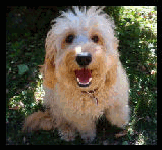
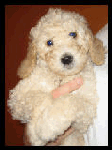
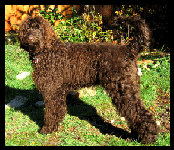
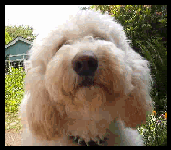
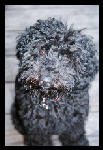
Morning Smile Labradoodles

Australian Labradoodle Training…
Crate Training
Crate training is a great way to house train your new puppy. Puppy should be given treats and toys in the crate to begin the training. The door should remain open while the puppy is getting used to the crate. Meals can be fed in the crate in the beginning as well. Once the puppy is comfortable going in and out of the crate on his or her own you can shut the door for a few moments at a time. I suggest giving the puppy his or her meal in the crate and shutting the door while puppy is eating. If puppy is quiet and continues eating, wait until puppy is finished eating and then open door. Please remember not to make a fuss about puppy coming out of the crate. You do not want puppy to think it’s a big deal to leave the crate. If puppy whines, barks, or howls when the door is closed on the crate ignore completely. Wait until a few moments of silence have gone by and then calmly and quietly open the door. Ignore puppy once he or she exits the crate.
You should gradually build up to leaving the puppy for longer periods of time in the crate. Once puppy is comfortable in the crate he or she should be put in the crate whenever you are unable to directly supervise him or her. Puppies must be watched constantly!
I recommend using a wire crate. If puppy whines, barks, or howls in the crate you can try putting a sheet or thin blanket over top of the crate for a more den-like environment.
The crate should be just big enough for the puppy to stand up, turn around, and lay down.
The most important thing to remember is to not let puppy out of crate when he or she whines, barks, or howls.
Puppies should only be left in the crate for short periods of time. An hour or two at a time for a young puppy is long enough. During the night the crate should be placed beside your bed where you can hear if puppy whines, barks, or howls. If puppy whines, barks, or howls at night wait until he or she is completely quiet and then take him or her outside. If puppy does not wake you up in the middle of the night you should set an alarm once in the night and take him or her outside.
Dogs should never be left all day in a crate. If puppy has to stay alone all day, puppy should be left in a gated off kitchen or bathroom with newspaper and lots of toys.
Adult dogs or older puppies can be left in a crate for up to four hours at a time. An adult dog can be exercised in the morning, left in the crate with chew toys for a few hours, taken for more exercise and a pee, and then returned to the crate for another few hours. This should only be done occasionally though. It is not fair for a dog to be left every day in a crate. If your dog must be left alone all day she should be left in a puppy proofed room rather than a crate.
Used responsibly, crates can be an excellent tool to raise a puppy.
House Training
As mentioned above, crate training is an excellent way to house train a puppy. Puppies must be watched constantly. They need to be taken outside every half an hour to hour at first. Puppy should be taken outside on a leash so that as soon as he or she pees or poops you can praise like crazy (even give a treat or two) and then return inside to play. If you catch your puppy peeing or pooping in the house you should startle your puppy so he or she stops and then quickly take puppy outside to finish. When the puppy finishes peeing or pooping outside make sure to give lots and lots of praise. This is how puppy will learn that you want him or her to go outside. If you find a mess done by your puppy but did not actually catch him or her in the act just clean it up. The puppy does not connect the correction to the preceding behaviour; it has to be during the act for the puppy to understand. Puppy’s nose should NEVER be rubbed in the mess.
NEVER use any form of physical punishment on your puppy or dog. It is cruel and totally unnecessary for training purposes.
Socialization
Puppies need to be socialized to every situation. They should be exposed to as many new situations, people, places, animals, etc, as you can think of. Examples of items for socialization include shopping carts, children, loud noises, bicycles, skateboards, other animals, and cars. If your puppy never sees these things as a young pup he or she may be scared of them later in life.
When your puppy gets scared of something you should either laugh or ignore whatever your puppy is afraid of. For example, if you puppy gets scared of a car driving by, you should either giggle so your puppy sees there is nothing to be afraid of or you can just totally ignore him or her. If you react to your puppy’s fear by saying ‘oh, poor baby’ or ‘it’s okay’ or even if you just pet your puppy, this reinforces the puppy’s belief that he or she should be afraid. If you walk by a fire hydrant and your puppy gets scared, you should laugh and walk ahead to the fire hydrant and touch it. If your puppy is too scared to walk up to the fire hydrant you should pick up your puppy and walk up to the fire hydrant and touch it. If your puppy sees that you are not scared of the fire hydrant he or she will see that it’s not really a scary thing.
Obedience Training
All puppies should take group obedience lessons. These are crucial for puppy socialization. They are an excellent way for experienced dog trainers to teach YOU how to train your puppy.
Please only use positive training techniques with your puppy. Make sure when you enroll in a training class that you ask if they use positive reinforcement. Then go watch a class taught by that trainer to see if it really is only positive reinforcement.
NEVER use any form of physical punishment on your puppy or dog. It is cruel and totally unnecessary for training purposes.
I highly recommend reading two books about dog behaviour and training:
- “Bones Would Rain From the Sky: Deepening Our Relationships with Dogs” by Suzanne Clothier
- “The Other End of the Leash” by Patricia McConnell
About Us… Contact Us… Meet Our Labradoodles… About Labradoodles… Labradoodle Health Warranty…
Adopting a Puppy… Labradoodle Shipping Information… Labradoodle Training Advice… Links